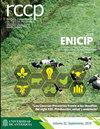碳水化合物源对放牧奶牛生产性能、瘤胃和全身健康的影响
IF 0.5
4区 农林科学
Q4 AGRICULTURE, DAIRY & ANIMAL SCIENCE
引用次数: 0
摘要
背景:Cenchrus clandestinus的营养限制——即高蛋白和低能量浓度——使得有必要向奶牛补充非纤维碳水化合物(NFC)来源,以提高生产性能。然而,这种补充可能导致瘤胃酸中毒。目的:评价高粱(sorghum vulgare,SV)、木薯根(Manihot esculenta,MES)或柑橘果肉(citrus sp.,C)部分替代玉米(Zea mays,ZM)对奶牛产奶量、瘤胃pH值和健康的影响。方法:在泌乳的前60天,对8头荷斯坦奶牛进行4×4拉丁方设计的评估。处理(等能量比,1.45±0.003 Mcal NEL/kg DM)由草和四种具有不同NFC来源的浓缩物的混合物组成。结果:不同处理在干物质摄入量、饲料效率、瘤胃pH、血液学和代谢特征方面没有观察到差异。瘤胃pH值高于6.0,证实没有瘤胃酸中毒。MES的产奶量(能量校正)、蛋白质和总固体含量高于C。结论:测试的NFC来源均未损害奶牛的瘤胃或系统健康,而MES提高了产奶量和质量。本文章由计算机程序翻译,如有差异,请以英文原文为准。
Effect of carbohydrate source on productive performance, ruminal and systemic health of grazing cows
Background: The nutritional limitations of Cenchrus clandestinus –i.e., high protein and low energy concentrations- make it necessary to supplement cows with non-fibrous carbohydrate (NFC) sources to improve productive performance. Nevertheless, such supplementation can lead to ruminal acidosis. Objective: To evaluate partial replacement of corn grain (Zea mays, ZM) with sorghum grain (Sorghum vulgare, SV), cassava root (Manihot esculenta, MES) or citrus pulp (Citrus sp., C) on milk yield and quality, ruminal pH and health of grazing cows. Methods: Eight Holstein cows were evaluated in a 4 x 4 Latin square design during the first 60 days of lactation. Treatments (isoenergetic rations, 1.45 ± 0.003 Mcal NEL/kg DM) consisted of a mixture of grass and four concentrates with different NFC sources. Results: No differences in dry matter intake, feed efficiency, ruminal pH, hematological and metabolic profile were observed between treatments. Rumen pH was higher than 6.0, confirming the absence of ruminal acidosis. Milk yield (energy-corrected), protein, and total solids were higher for MES vs. C. Conclusions: None of the NFC sources tested compromised the ruminal or systemic health of the cows, while MES improved milk yield and quality.
求助全文
通过发布文献求助,成功后即可免费获取论文全文。
去求助
来源期刊

Revista Colombiana De Ciencias Pecuarias
AGRICULTURE, DAIRY & ANIMAL SCIENCE-
CiteScore
0.80
自引率
0.00%
发文量
18
审稿时长
6-12 weeks
期刊介绍:
The editors of Revista Colombiana de Ciencias Pecuarias (RCCP) welcome the submission of original manuscripts on experimental and clinical studies associated with the broad areas of animal sciences and veterinary medicine as they interface with biochemistry, molecular biology, physiology, pharmacology, toxicology, pathology, microbiology, parasitology, immunology and epidemiology. The scope of the journal includes studies of basic and applied research in animal management and production, feeding and nutrition, reproduction, breeding, genetics, animal welfare and behavior; as well as animal production focussed from biotechnology, soil science, agrostology, silvopastoral systems, livestock economics and the environment.
The criteria for acceptance of papers submitted for publication are originality, quality and clarity of the content. Each contribution must be based on original, unpublished research that has not been simultaneously submitted to other journals. All papers will be peer reviewed. All authors bear responsibility for ensuring the integrity and quality of their reported research. It is the author''s responsibility to secure permission to use figures or tables that have been published elsewhere.
Contributions may be classified as original research, review, rapid communication, clinical case studies or methodological articles, as well as news/commentaries or letters to the editor. Most review articles are invited by the editor. Authors interested in submitting a review article should contact the corresponding editor. Rapid publication of original manuscripts is a goal of the journal. Manuscripts must be written in English. Each manuscript is considered for publication with the understanding that it has not been simultaneously submitted to any other journal. Upon acceptance for publication, papers are subject to editorial review and revision.
 求助内容:
求助内容: 应助结果提醒方式:
应助结果提醒方式:


